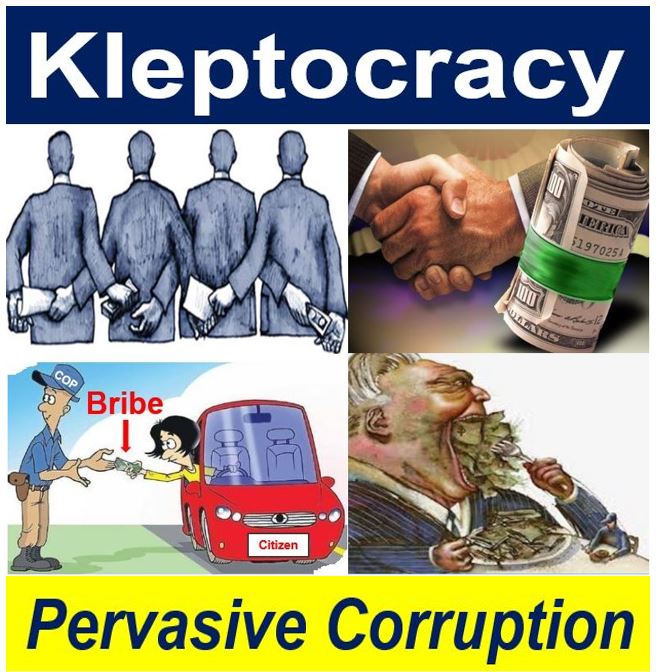A kleptocracy is a thieving, corrupt government whose politicians and civil servants abuse their powers of state to steal money for personal gain; to feather their own nests, i.e., rule by a thief or thieves.
Those in power steal the country’s national resources.
In a kleptocracy, people in charge seek personal gain and status at the expense of taxpayers and other citizens.
In most cases, the leaders in a kleptocracy aim to remain in control through collusion, corruption, and nepotism (favoring relatives and friends).
The leader, lawmakers, and public officials in a kleptocracy treat their country’s treasure as if it were their own personal bank account or treasure chest. They typically pretend to be honest, but are, in fact, exceedingly greedy and corrupt.
Kleptocrats
Those in a kleptocracy who abuse their powers and steal from the country are called kleptocrats. Kleptocrats exploit the national wealth and use the proceeds for their own gain.
The Online Etymology Dictionary says that in the English language, the term was first used with its modern meaning in 1819, in reference to Spain. Etymology is the study of the origin of words.
Examples of kleptocracy
-
Russia
Immediately after the fall of the Soviet Union, Russia became ruled by Mafia-friendly government members who allocated themselves valuable shares during the privatization of many of the country’s companies. They also accepted bribes to the tune of billions of dollars from foreign businesses, and siphoned off international aid into their own private offshore bank accounts.
-
Equatorial Guinea
On September 29th, 2011, eleven sports cars worth $5 million were seized by French police just off the Champs-Élysées in Paris. They formed part of the wealth amassed in France by the Obiangs, Equatorial Guinea’s ruling family – President Teodoro Obiang Nguema Mbasogo and family – where more than 70% of the oil-rich country’s population lives below the poverty line.
According to Forbes magazine, President Obiang, whose net worth is estimated to exceed $600 million, is one of the wealthiest heads of state in the world.
-
Egypt
Hosni Mubarak (1928-2020), who was president from 1981 to 2011, was estimated to have a net worth with his immediate family of $70 billion. According to theweek.com, some of it was tied up in properties in Egypt, London, New York and Los Angeles. The rest was thought to be stashed away in offshore accounts and foreign banks.

Below is a list of kleptocracy leaders and their estimated net worth (Source: Transparency International):
- $15 billion – $35 billion: Hajji Muhammad Suharto (1921-2008), former president of Indonesia.
- $10 billion or more in 1986 ($21.6 billion in 2014 dollars): Ferdinand Marcos (1917-1989), former president of the Philippines.
- $5 billion: Mobutu Sese Seko (1930-1997), former military dictator and president of the Democratic Republic of the Congo (which he renamed Zaire in 1971).
- $2 billion to $5 billion: Sani Abacha (1943-1998), former president of Nigeria.
- $1 billion: Slobodan Milošević (1941-2006), former president of Serbia.
- $300 million to $800 million: Jean-Claude Duvalier (1951-2014), known as ‘Baby Doc’, former president of Haiti.
- $600 million: Alberto Fujimori (born 1938), former president of Peru.
- $114 million to $200 million: Pavlo Lazarenko, former Ukrainian prime minister.
- $100 million: Arnoldo Alemán (born 1946), former president of Nicaragua.
- $78 million to $80 million: Joseph Estrada, former president of the Philippines.
Anti-Corruption Award 2016
In December 2016, Brazil’s Carwash Task Force (Força-Tarefa Lava Jato) was selected by Transparency International as the winner of the Anti-Corruption Award for 2016.
The Carwash Operation started as a local money-laundering probe and grew into the country’s biggest investigation ever. It uncovered cases of state capture and corruption across Brazil.
Transparency International said:
“The state prosecutors from the Carwash Task Force have been on the front line of investigations in Brazil since April 2014. Dealing with one of the world’s biggest corruption scandals, the Petrobras case, they have investigated, prosecuted, and obtained heavy sentences against some of the most powerful members of Brazil’s economic and political elites.”
The Greek word “kleptes”
“Kleptocracy” comes from the Greek word “kleptes,” which means “thie,f” and “kratos,” which means “power” or “rule.”
There are many words in the English language that have evolved from “kleptes.” Let’s take a look at some of them, their meanings, and how we can use them in a sentence:
-
Kleptomania (Noun)
A psychiatric disorder characterized by an irresistible impulse to steal things.
Example: “After seeking help, he was diagnosed with kleptomania, which explained his compulsion to steal items he didn’t need.”
-
Kleptomaniac (Noun)
A person suffering from kleptomania.
Example: “The kleptomaniac received therapy to manage her urges to steal.”
-
Kleptocracy (Noun)
A government or state where those in power exploit national resources and steal; rule by a thief or thieves.
Example: “The country suffered under the kleptocracy, with leaders embezzling funds for personal gain.”
-
Kleptocratic (Adjective)
Relating to or characteristic of a kleptocracy.
Example: “The kleptocratic regime was notorious for its corruption and mismanagement of public assets.”
-
Kleptologist (Noun)
A person who studies theft or stealing behaviors.
Example: “As a kleptologist, she researched the psychological motivations behind shoplifting.”
-
Kleptocratical (Adjective)
Pertaining to a kleptocracy; involving or relating to government corruption and thievery.
Example: “The kleptocratical practices of the administration led to widespread poverty and dissent.”
-
Klepto (Noun)
Slang for someone who steals; a thief.
Example: “He was labeled a klepto after repeatedly taking items from his friends without permission.”
Video – What is a Kleptocracy?
This video, from our YouTube partner channel – Marketing Business Network, explains what ‘Kleptocracy’ means using simple and easy-to-understand language and examples.
